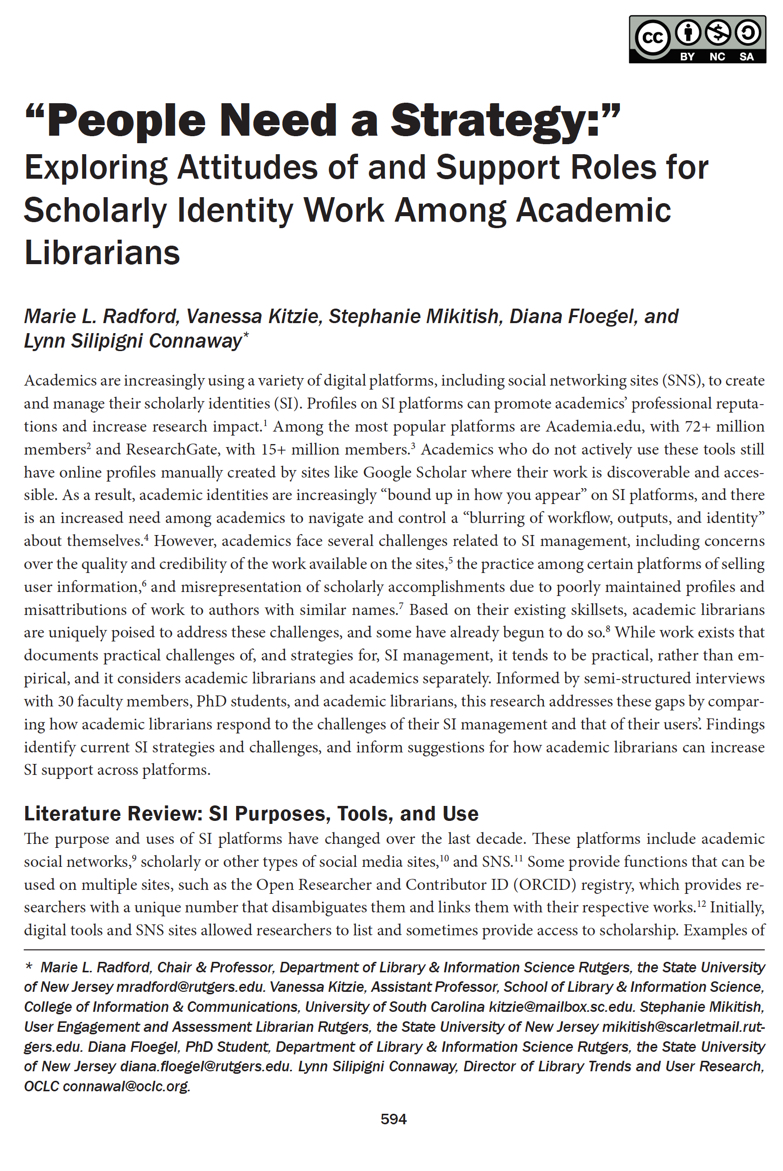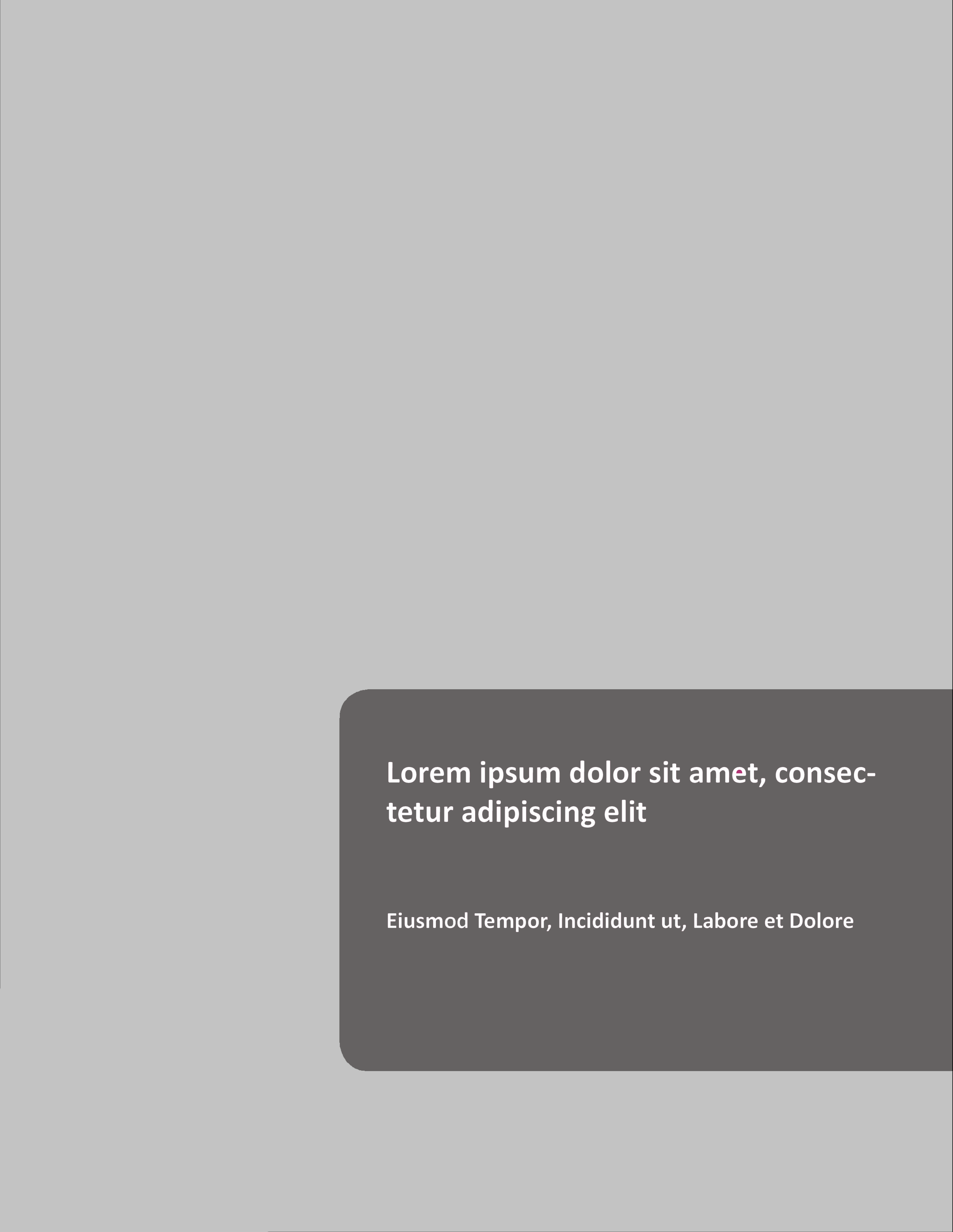“People Are Reading Your Work”: Scholarly Identity and Social Networking Sites
Scholars are increasingly asked to report on their research’s impact, productivity, and citation counts by administrators, colleagues, and external peer reviewers when being considered for hire, tenure and promotion. Further, scholarly work is usually created and disseminated digitally, with developing platforms and metrics that rend this work and its impact visible (e.g., ORCID, ResearchGate, Academia.edu). This growing trend has resulted in increased expectations for researchers to cultivate a “scholarly identity” (SI) that allows them to promote their work and person, and to build their reputations via academic social networking sites (SNS).
We conducted 30 interviews with communication faculty and Ph.D. students, plus academic librarians, to explore their SI practices and concerns. Participants reported that academic SNS allow them to: connect to other researchers, share and exchange materials, and disseminate their academic activities. Participants said that SI work facilitated tenure and promotion efforts, and some frequently utilized social affordances of SNS for academic purposes.
However, participants also shared a number of drawbacks to SI work. Concerns related to their online presence included context collapse, time constraints, privacy issues, and confusion over which sites to use and how to use them. Moreover, participants discussed platforms’ for-profit motivations; participants do a great deal of work to input data into SNS, which in turn sell participants’ data, advertise to participants, and more. Finally, participants noted that their ability to construct an online SI can be tied to wider notions of power, privilege, and marginalization.
Researchers involved with this project continue to develop and refine strategies and guidelines related to academics’ SI work. Moreover, we are interested in further exploring potential opportunities for academic librarians to add SI-related assistance to their services.
Find handouts, including tips, strategies, and a bibliography, in this public Google Drive folder. (Last updated October 2018)
Publications
Related Work
Radford, M. L, Radford, G. P., & Floegel, D. (2018). “People are reading your work:” Scholarly identity and social networking sites - The good, the bad, and the ugly.New York State Communication Association, Callicoon, NY, October 12-14, 2018.
Radford, M.L., Connaway, L.S., Kitzie, V., Floegel, D., Radford, G., & Chayko, M. (2018). Creating and cultivating a scholarly identity within digital worlds. iConference 2018, Sheffield, UK, March 25-28, 2018.
-

'People Need a Strategy:' Exploring Attitudes of and Support Roles for Scholarly Identity Work Among Academic Librarians
10 April 2019
Marie L. Radford, Vanessa Kitzie, Stephanie Mikitish, Diana Floegel, Lynn Silipigni Connaway
Academics increasingly use digital platforms and social networking sites to manage their scholarly identities (SI). This empirical study proposes that academic librarians can assist in digital SI management and identifies strategies for librarians to increase SI support across platforms.
-

Investigating Practices for Building an Ethical and Sustainable Scholarly Identity with Online Platforms and Social Networking Sites
1 February 2019
Marie L. Radford, Vanessa Kitzie, Stephanie Mikitish, Diana Floegel, Gary P. Radford, Lynn Silipigni Connaway
Informed by 30 semi‐structured interviews with faculty, Ph.D. students, and academic librarians, this exploratory research examines how individuals create, cultivate, and manage their scholarly identity (SI) using online platforms.
Presentation Recordings
Video: Re(Casting) Call: Sculpting Services & Strategies for Cultivating Online Scholarly Identity
Video | 11 April 2019
By Lynn Silipigni Connaway, Marie L. Radford, Lisa Janicke Hinchliffe, Kristen Mapes
Scholars are increasingly required to manage their online scholarly identity (SI) using digital tools and social networking sites like ORCID to promote professional reputation and research impact. Panelists consider the following and more: How should (or could) academic librarians assist users who wish to build their SI? What services are currently offered? What opportunities, as well as concerns, surround this work?
Lead
Marie L. Radford, Ph.D., Professor, Rutgers University
Team Members
Vanessa L. Kitzie, Ph.D., Assistant Professor, University of South Carolina
Stephanie Mikitish, Ph.D., Data Analyst, Library of Congress
Lynn Silipigni Connaway, Senior Research Scientist and Director of User Research, OCLC Research
Gary Radford, Ph.D., Professor, Fairleigh Dickinson University
Mary Chayko, Ph.D., Teaching Professor and Director of Undergraduate Interdisciplinary Studies, Rutgers University
Diana Floegel, Doctoral Candidate, Rutgers University